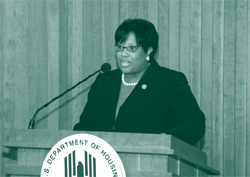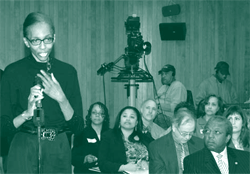June 2008
In this Issue
Black Colleges and Universities Lend a Helping Hand
Learning To House the Homeless
Researching HUD's Housing Programs
What We Know About LIHTCs
In the next issue of ResearchWorks
Black Colleges and Universities Lend a Helping Hand
Representatives from historically black colleges and universities (HBCUs) recently gathered in Washington, DC to share accomplishments made possible by HUD's HBCU Community Development Grant program. Each year, HUD invites HBCUs to compete for funds earmarked for revitalizing America's neighborhoods. The rationale for the grant program is twofold. First, colleges and universities are repositories of knowledge, research, and skills that, when applied to community affairs, enable local residents and stakeholders to develop and implement strategies for healthy, viable neighborhoods. Second, stronger campus-community relations improve the quality of higher education, better preparing students to develop their own communities in the future. Thus, HBCUs enrich their educational programs and strengthen their surrounding neighborhoods.

Success Stories
Successes showcased during the April 2008 roundtable discussion hosted by HUD’s Office of University Partnerships reflected the extent of the grant program’s success. Moderated by Lezli Baskerville, president and CEO of the National Association for Equal Opportunity in Higher Education, the roundtable revealed various ways that HBCUs tailor grant resources to help their local communities.
Benedict College
David Swinton, president of Benedict College in Columbia, South Carolina, described how he found a private campus in a neighborhood riddled with poverty, disrepair, and crime. Realizing that it was in Benedict's strategic interest to improve its setting, Swinton led efforts to channel economic resources into the area. In 1995, the college established the Benedict-Allen Community Development Corporation (CDC) to revitalize its two surrounding communities, Waverly and Read Street. Using $3.74 million in HBCU funds received from HUD over the past 8 years, the CDC has leveraged an additional $7.53 million for a total community investment of $11.27 million. The joint achievements of the college and its neighbors include a park, 21 new or renovated homes, the acquisition of 30 substandard or vacant houses and lots for redevelopment, housing and credit counseling plus financial literacy services for 2,100 clients, job training and placement services for more than 400 low-income individuals, a business incubator program, and a revolving loan fund for small and minority businesses.

Winston-Salem State University
In North Carolina, Winston-Salem State University used HBCU grant funds to establish a CDC that leads revitalization, housing, beautification, and preservation efforts in a neighborhood along the community's Martin Luther King, Jr. Drive corridor. Carol Davis, executive director of Simon-Green Atkins CDC, reported that their efforts have produced affordable housing opportunities for 18 families and an increase of more than $1.5 million in the tax base. First-time homebuyers have received $200,000 in downpayment and closing cost assistance. The new homes have sparked resident participation in neighborhood groups and an interest in planning future neighborhood development. The funds have also helped create a small business loan pool, allowing these employers to generate 65 additional jobs in the community.
South Carolina State University
The CDC sponsored by South Carolina State University invites residents to identify critical needs along the northeastern corridor of Orangeburg. This input guides the CDC in its efforts to develop affordable, safe housing in a revitalized neighborhood. In addition to activities common to other HBCU grantees, South Carolina State's CDC offers homebuyer education workshops that give participants a rigorous 4-week course in purchasing a home. Local bankers, attorneys, real estate agents, and other housing professionals help teach this class and give technical assistance to the students, enabling them to understand credit, choose the right mortgage, learn borrowing and budgeting basics, recognize predatory lending, know what to do to prevent foreclosure, and access post-purchase counseling. "We're not giving a handout; we're giving a hand up, and that hand up is helping individuals become homeowners," says Merylin Jackson, executive director of the Northeastern Corridor of Orangeburg CDC.
Grants + Resources + Students = Community Renewal
Participants in the April roundtable also discussed resources other than money that help ensure the success of community revitalization projects. John Watson, interim president of LeMoyne-Owen College in Memphis, stressed the importance of equitable partnerships among government, education, business, and community groups that share resources, rewards, and risks. Representatives from Howard University have learned from experience that vision, development expertise, talent for acquiring and leveraging resources, and the ability to manage change are essential. In addition, Howard University and its community partners emphasize the importance of fostering long-term institutional commitment, consensus-building, political support, patience, and persistence in bringing community improvements to fruition.
At the same time that HBCUs are investing in the future of American communities, their students are also participating in neighborhood revitalization. Computer science students at Benedict College, for example, are digitizing the curriculum for a homebuyer education course, developing websites and webcasts for neighborhood associations, and helping small businesses use the Benedict-Allen CDC's revolving loan fund to develop web presence, business plans, and management training. LeMoyne-Owen College students intern with the city of Memphis and with Shelby County, Tennessee; others gain experience by working with the LeMoyne-Owen CDC in housing, after school, and research programs. Howard University gives students experience in architectural design, historic preservation, cultural heritage research, and social service case management. Other HBCUs have trained student interns in geographic information systems technology and taught 10-year-olds in the neighborhood to design their own web pages. Thus, human capital in the form of skills, leadership, and commitment is developed among HBCU students and faculty, while tangible improvements to communities are being achieved.

